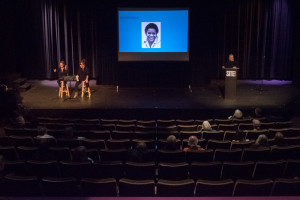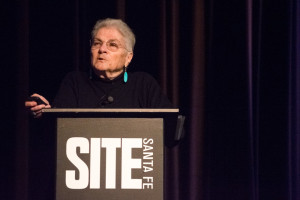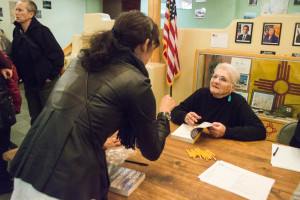Tags
Related Posts
Share This
This Is Now

Many residents of Santa Fe visited the Armory for the Arts on Nov. 15, to hear readings from “Only the Road/Solo el Camino,” edited and translated by Margaret Randall. Photo by Jennifer Rapinchuk.
The night of Nov. 15 found many of Santa Fe’s citizens in the lobby of the Armory of the Arts theater, queueing up to purchase copies of Margaret Randall’s latest book, Only the Road / Solo El Camino, which covers 80 years of Cuban poetry. The books disappeared quickly from the table, prompting many people in attendance to purchase their copies before the event began. Inside the theater, scarves and jackets were shed as old friends found each other across aisles, some thumbing through copies of the book as they settled into seats. Bilingual and including short biographies of each poet, Only the Road / El Solo Camino emphasizes diversity as well as excellence, aiming for a balance that asserts that great poetry can be written by any person regardless of class, gender or race. Randall has spent years in Cuba and so is familiar with its people, its culture and its art; her knowledge is clear in her book’s introduction, which attempts to present Cuba’s recent history in a light unbiased by popular opinion.
Joanne Lefrak, director of Education and Outreach at SITE Santa Fe, started the evening with thanks and an introduction, occasionally turning to Randall to confirm her Spanish pronunciation and getting smiles and nods in return. Meanwhile, perched in the corner of the stage was two American Sign Language translators take turns translating the speeches and introductions in real time. Before beginning her abbreviated reading of 18 poets, Randall gave a brief history of Cuba, to give context to life beyond the “sugar-cane curtain,” as it were. She emphasized the deep divide between those who stayed in Cuba throughout the Revolution and those who left, the exiles. This divide was exacerbated by the United States’ continued antagonism toward its southern island neighbor; Randall described an incident with the Pan American Union, which had bought 500 subscriptions to the magazine El Corno Emplumado / The Plumed Horn, which she had co-founded. In 1967, issue 23 featured a number of Cuban writers. The PAU protested the magazine making Cuban art available to a North American audience and subsequently cancelled their subscriptions when El Corno Emplumado refused to remove the Cuban writers’ work.

Margaret Randall, editor and translator of “Only the Road/Solo el Camino,” reads selected poems by passionate and eloquent Cuban writers who reached their prime during the revolutionary era in Cuba. Photo by Jennifer Rapinchuk.
Now that the United States seems to be in another cultural moment of xenophobia, it seemed an appropriate time to publish a book that showcases Cuban poets in all their infinite diversity, from LGBT+, varied races and classes, hailing from every region of the country. As a whole, the book interrogates what constitutes Cuban poetry and what it means to be Cuban, especially now that relations between Cuba and the rest of the world are relaxing. In reading Nicolás Guillén’s “Tengo / I Have,” which asserts the dignity of being a Cuban citizen, where he can converse with a banker in campañero, it seems incredible that this book can be read outside of Cuba today with no backlash. Nancy Morejón’s “Mujer Negra / Black Woman” similarly praises the country’s commitment to equality among its citizens, equals who “dance / around the tree [they] planted for communism,” especially in contrast to her ancestors’ kidnapping and enslavement.
In keeping with the book’s commitment to diversity, the poems within also express discomfort with Cuba’s policies. Lourdes Casal’s poem “Para Ana Veldford / For Ana Feldford” describes the disconnect of being “too Havana for New York, / too much a New Yorker to be / —even become once again — / anything else.” Having created the magazine Areíto with other exiles, Casal was a key figure in bridging the divide between Cuba and its exiles. In her poem “Definición / Definition”, Casal described the exile experience as “living where there isn’t a single house / where we’ve spent our childhood,” living in a place where there were no childhood memories or associations.

Editor and Translator of “Only the Road/Solo El Camino” Margaret Randall signs books after reading the inspiring poems from a variety of Cuban poets. Photo by Jennifer Rapinchuk.
When signing books at the end of the night, Randall responded to a particular attendee’s enthusiasm by saying had it not been for the time limit, she would’ve included more poets to better reflect the immense diversity of Cuba’s poets. Now that attendees have their own copies, they are free to discover that diversity for themselves, the range of ages, hometowns, genders, sexualities and experiences. As the United States increasingly looks to recognize the diversity within its own country, a book that anthologizes the very same thing in Cuba’s history seems increasingly important. With our current political situation in our own country, it is particularly resonant that this example comes from a country with which the United States has over 60 years of animosity, only restored in Jul. 2015. The poet Victor Rodriguez Núñez said of Cuban poets, “[The new poets] continue to be dissidents— particularly with regard to dehumanization, no matter where it comes from. Still none of them proposes to capitalism in our country, or celebrates private property, market economy or free enterprise.” In our country, we can only hope to find the same satisfaction with our own form of government, a goal that may come only after our own cultural revolution. When we will reach this point is yet to be seen.






 Jackalope Magazine is the student magazine of Santa Fe University of Art and Design. Building on the interdisciplinary nature of our education, we aim to showcase the talent of our university and character of our city.
Jackalope Magazine is the student magazine of Santa Fe University of Art and Design. Building on the interdisciplinary nature of our education, we aim to showcase the talent of our university and character of our city.
0 Comments
Trackbacks/Pingbacks